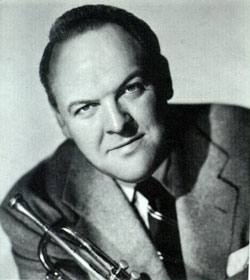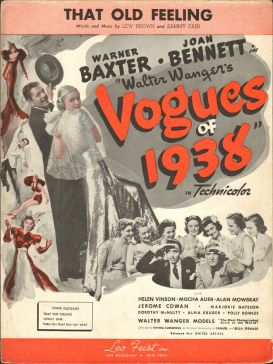
Edward William May Jr. was an American composer, arranger and trumpeter. He composed film and television music for The Green Hornet (1966), The Mod Squad (1968), Batman, and Naked City (1960). He collaborated on films such as Pennies from Heaven (1981), and orchestrated Cocoon, and Cocoon: The Return, among others.
"Too Darn Hot" is a song written by Cole Porter for his musical Kiss Me, Kate (1948).
"All of You" is a popular song written by Cole Porter and published in 1954.

"Night and Day" is a popular song by Cole Porter that was written for the 1932 musical Gay Divorce. It is perhaps Porter's most popular contribution to the Great American Songbook and has been recorded by dozens of musicians. NPR says "within three months of the show's opening, more than 30 artists had recorded the song."

"That Old Feeling" is a popular song about nostalgia written by Sammy Fain, with lyrics by Lew Brown. It was published in 1937.
"My Heart Belongs to Daddy" is a song written by Cole Porter for the musical Leave It to Me! which premiered on November 9, 1938. It was originally performed by Mary Martin, who played Dolly Winslow, the young "protégée" of a rich newspaper publisher, her sugar daddy. In the musical, Dolly wears a fur coat while stranded at a Siberian railway station and surrounded by eager men. She performs a striptease and sings to them about how since she has her "daddy", she may still flirt with other men but won't "follow through".
"Heat Wave" is a popular song written by Irving Berlin for the 1933 musical As Thousands Cheer, and introduced in the show by Ethel Waters.

Louis Isidore "Buddy" Bregman was an American arranger and conductor.
"This Can't Be Love" is a show tune and a popular song from the 1938 Rodgers and Hart musical The Boys from Syracuse when it was sung by Eddie Albert and Marcy Westcott. The lyrics poke fun at the common depiction of love in popular songs as a host of malignant symptoms, saying, "This can't be love because I feel so well."

Here's to the Ladies is an album by Tony Bennett, released in 1995.
"Little Girl Blue" is a popular song with music by Richard Rodgers and lyrics by Lorenz Hart, published in 1935. The song was introduced by Gloria Grafton in the Broadway musical Jumbo.
"It's a Lovely Day Today" is a popular song written by Irving Berlin for his successful musical Call Me Madam (1950) when it was introduced by Russell Nype and Galina Talva. The musical was adapted as a movie in 1953 and the song "It's a Lovely Day Today" was performed by Donald O'Connor and Vera-Ellen.
"The Best Thing for You (Would Be Me)" is a popular song written by Irving Berlin and published in 1950. It was featured in the 1950 Broadway musical play, Call Me Madam, in which it was introduced by Ethel Merman in a scene with Paul Lukas. The 1953 film version also featured the song when it was sung by Ethel Merman and George Sanders.
"I Concentrate on You" is a song written by Cole Porter for the 1940 film Broadway Melody of 1940, where it was introduced by Douglas McPhail.
"Get Out of Town" is a 1938 popular song written by Cole Porter, for his musical Leave It to Me!, where it was introduced by Tamara Drasin.
"Ridin' High" is a 1936 popular song written by Cole Porter, for his musical Red, Hot and Blue, where it was introduced by Ethel Merman.
"Spring is Here" is a 1938 popular song composed by Richard Rodgers, with lyrics by Lorenz Hart for the musical I Married an Angel (1938), where it was introduced by Dennis King and Vivienne Segal.
"Johnny One Note" is a 1937 show tune from the 1937 Rodgers and Hart musical Babes in Arms, where it was introduced by Wynn Murray. Judy Garland sang it in the Rodgers & Hart biopic Words and Music (1948).

"Mean to Me" is a popular song with music by Fred E. Ahlert and lyrics by Roy Turk, published in 1929. Hit versions that year were by Ruth Etting and by Helen Morgan. Ben Bernie and the Hotel Roosevelt Orchestra also recorded what might be the first male version in February 1929 with vocals by Scrappy Albert.
The following is the discography for big band and traditional pop arranger Nelson Riddle (1921–1985).





